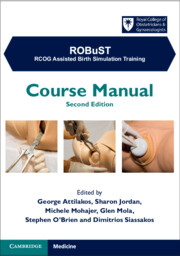Book contents
- ROBuST
- Reviews
- ROBuST
- Copyright page
- Contents
- Contributors
- Preface
- Acknowledgements
- Abbreviations
- Chapter 1 Trends in Assisted Vaginal Birth and Future Practice
- Chapter 2 Indications and Assessment for Assisted Vaginal Birth
- Chapter 3 Non-technical Skills
- Chapter 4 Vacuum-Assisted Birth
- Chapter 5 Non-Rotational forceps and Manual Rotation
- Chapter 6 Rotational Forceps
- Chapter 7 Caesarean Section at Full Cervical Dilatation
- Chapter 8 Medico-Legal Aspects of Assisted Vaginal Birth (AVB)
- Chapter 9 Analgesia and Anaesthesia for Assisted Vaginal Birth
- Index
- References
Chapter 3 - Non-technical Skills
Published online by Cambridge University Press: aN Invalid Date NaN
- ROBuST
- Reviews
- ROBuST
- Copyright page
- Contents
- Contributors
- Preface
- Acknowledgements
- Abbreviations
- Chapter 1 Trends in Assisted Vaginal Birth and Future Practice
- Chapter 2 Indications and Assessment for Assisted Vaginal Birth
- Chapter 3 Non-technical Skills
- Chapter 4 Vacuum-Assisted Birth
- Chapter 5 Non-Rotational forceps and Manual Rotation
- Chapter 6 Rotational Forceps
- Chapter 7 Caesarean Section at Full Cervical Dilatation
- Chapter 8 Medico-Legal Aspects of Assisted Vaginal Birth (AVB)
- Chapter 9 Analgesia and Anaesthesia for Assisted Vaginal Birth
- Index
- References
Summary
The components of a good AVB are complex and layered. They go far beyond a degree of knowledge and technical ability. They encompass a range of cognitive and social skills that promote respect for women and their partners and enable an environment in which women feel safe and secure, acknowledging her rite of passage and the privilege of assisting at the birth of a new life. This chapter explores our understanding of these important ‘non-technical’ skills of a consummate accoucheur.
- Type
- Chapter
- Information
- ROBuST: RCOG Assisted Birth Simulation TrainingCourse Manual, pp. 24 - 38Publisher: Cambridge University PressPrint publication year: 2024



